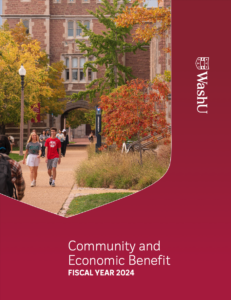Washington University in St. Louis continues to play a vital role in the local economy. In fiscal year 2024, the university’s direct and indirect contributions to the St. Louis economy totaled $9.3 billion.
$3.9B
in direct spending leading to $9.3 billion total impact
22,181
employees
$300.8M
in construction
$507M
investment in financial aid with 22% of Class of 2028 students who are Pell Grant-eligible
$978M
in research funding that fuels groundbreaking discovery, innovations in patient care and new economic opportunities
$252M
in uncompensated medical care provided
$210M
in local spending from students coming to the region
2024 Community and Economic Benefit
In 2024, Washington University directly contributed $3.9 billion to the local economy, spending $300.8 million in construction, $285 million in local goods and services and $2.4 billion in employee compensation. With 22,181 employees, WashU is the region’s second-largest employer.
WashU also serves as a leader in patient care and public health. This year, WashU physicians provided 2.59 million patient visits and $252 million in uncompensated medical care.
Economic and Community Impact
Fiscal Year 2024
People, purchasing and construction
WashU is committed to the health and growth of our region and has long been a leading employer both in the region and the state. Tangible proof of this investment: the Jeffrey T. Fort Neuroscience Research Building, which was dedicated in January 2024. The $616 million, 609,000 square foot facility is one of the world’s largest neuroscience buildings, providing WashU researchers state-of-the-art facilities so they can develop new diagnostic tools, drugs, and therapies to help people with brain and other neurological diseases.
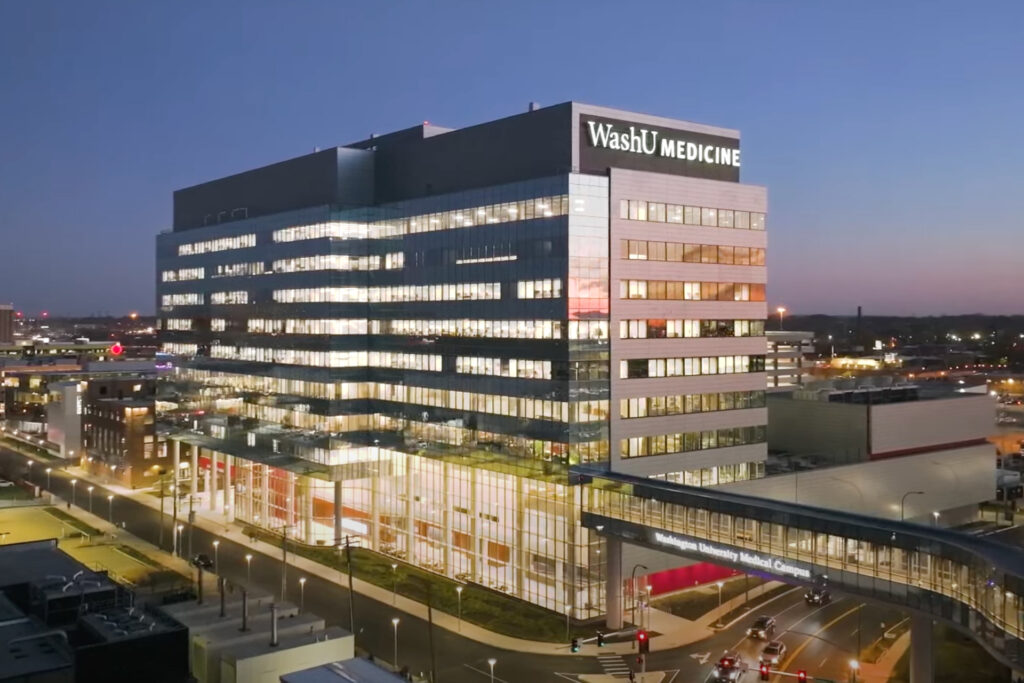
I see this building as the ultimate statement of our school, our university, our city, our state-that here in this place, in St. Louis, at the Gateway to the West, the most important advances in understanding the brain will happen.
David H. Perlmutter, MD, executive vice chancellor for medical affairs and the George and Carol Bauer Dean of WashU Medicine
$9.3B
total university economic impact
$3.9B
in direct spending (construction, purchasing, employee compensation and student spending)
57,250
total supported jobs in the region (direct and indirect)
$2.4B
in salaries
$300.8M
in construction
22,181
WashU employees
Community support
WashU’s School of Law recently established a Veterans Law Clinic. Through the clinic, law students can assist low- and moderate-income veterans in such matters as requesting upgrades of their discharge characterization and correction of military records. These updates can make veterans eligible for more benefits and support systems, including health care through the Department of Veterans Affairs.
We believe that this is an incredible opportunity for students to make a real difference in the community with their legal skills.
Sarah Narkiewicz, associate dean for clinical education at WashU School of Law
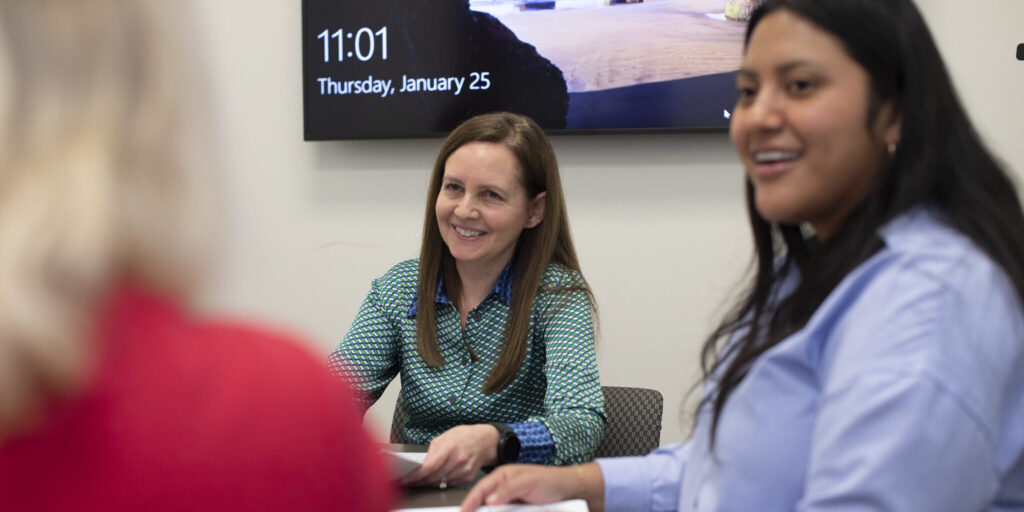
$5.4M
support for community orgs and neighborhoods
$285M
local purchasing
$210M
student spending in the region
PK–12 educational opportunities
In neighboring University City, WashU’s Institute for School Partnership (ISP) is helping teachers at the Julia Goldstein Early Childhood Education Center weave rigorous high-quality math instruction into project-based learning. The partnership is part of ISP’s STEMpact District Immersion, an ambitious effort to improve math outcomes. And at University City High School, Rowhea Elmesky, associate professor of education, collaborated with educators and students to reduce suspensions and increase attendance and engagement. Her work was recognized by WashU’s St. Louis Confluence Collaborative, which supports research and partnerships that strengthen the region.
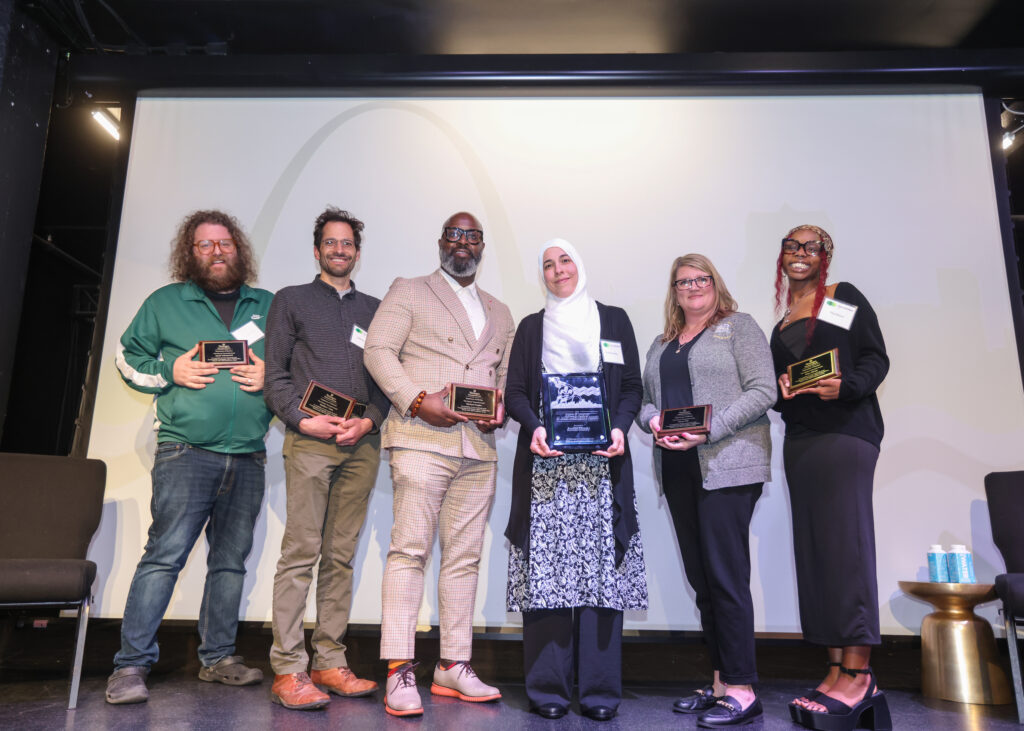
Purposeful and intentional engagement with the community around us, paired with innovative and exceptional academic research, can create real, tangible change in people’s lives.
Provost Beverly Wendland
$6.4M
total spent on PK-12
344
schools served by the Institute for School Partnership
5,056
teachers participated in ISP programs
189,000
students engaged and served by ISP programs
Educational access
WashU is making good on its promise to support more students from small towns and rural communities. In recent years, WashU has increased visits to rural schools, helped launched the STARS (Small-Town and Rural Students) College Network, and created the free Rural Scholars Academy for talented high school sophomores. WashU also is more affordable for rural families. The WashU Pledge covers the full cost of a WashU education for low-income students from Missouri and Southern Illinois. And this year, WashU implemented its no-loan policy, which enables students to graduate debt-free. The result: a 53% increase in the number of enrollees from rural communities.

Some people see rural students through a deficit lens because their schools aren’t always well resourced or have AP classes. What I see are students who have an incredible work ethic and really care about their community. That sounds like a WashU student to me.
Dacoda Scarlett, inaugural associate director of rural recruitment in the Office of Undergraduate Admissions
$507M
investment in financial aid
337
WashU Pledge students enrolled
22%
Pell-eligible undergraduate students
Community health and support
This year, Siteman Cancer Center – based at WashU Medicine and Barnes-Jewish Hospital – opened a new home for world-class outpatient cancer care. WashU Medicine physicians will diagnose and treat patients in the Gary C. Werths Building with the most advanced, lifesaving therapies available. Those patients will also have access to clinical trials led by WashU doctors. Siteman is the only National Cancer Institute-designated Comprehensive Cancer Center in Missouri and Southern Illinois. In addition to delivering exceptional care, Siteman is consistently recognized for its innovative cancer prevention and community outreach efforts, with screenings and education provided to tens of thousands of people in our state each year.
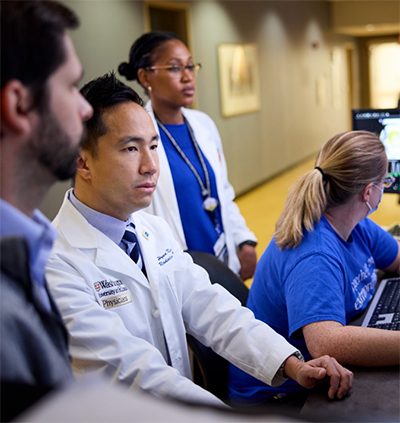
We want every patient who walks through our doors to experience a supportive, calming, and hopeful environment. This building was created with those goals in mind.
Timothy J. Eberlein, MD, director of Siteman Cancer Center, senior associate dean for cancer programs at WashU Medicine and BJC Healthcare
2.59M
total patient visits
$252M
in uncompensated care
1.74M
total outpatient visits
851,871
total inpatient visits
Research and innovation
For the first time, annual research funding to WashU surpassed $1 billion in FY 2024. The funding, from a variety of sources including federal grants, foundations, and donors, supports WashU investigators tackling the world’s greatest challenges. In federal FY24, WashU Medicine received $948 million in funding, including $683 million from the National Institutes of Health (NIH). WashU is No. 3 in the nation for NIH funding and, for the second consecutive year, WashU Medicine is No. 2 among all U.S. medical schools in the amount of funding it receives from NIH.
Also in FY24, the McKelvey School of Engineering received the largest grant in its history – $26 million from the National Science Foundation to convert carbon dioxide into environmentally friendly chemicals and products. These research dollars boost Missouri’s economy, sparking job growth, new construction, and local spending. Data shows that every $1 million in research funding creates 11 local jobs.
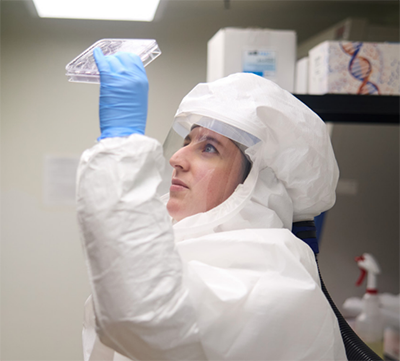
$1B
in external research funding
442
patents filed
10
startups formed


